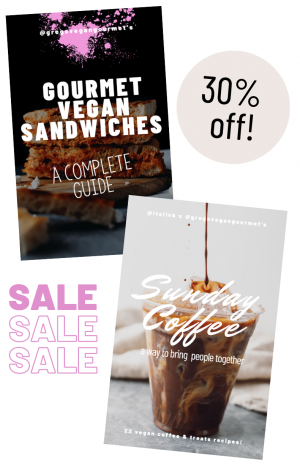Disclaimer: I am not a doctor. This is entirely based on my own experience and research. Use discretion when following these guidelines and consult your doctor if you are unsure if a recommendation may be helpful for you. This post is not sponsored and does not contain any affiliate links.
It seems like more and more people are struggling with digestive issues lately. Whether it is bloating, cramping, or food sensitivities, more people than ever are experiencing digestive distress. I myself have suffered from IBS (irritable bowel syndrome) for 5 years now and although it has gotten better, it is something I deal with on a daily basis.
While I only have experience with my own symptoms, I hope I can be of help to some of you in dealing with yours. Below, you will find some of my tips for dealing with symptoms like bloating, cramping and pain, as well as some helpful resources.
BLOATING
Everyone feels bloated from time to time, and some people even mistake a feeling of being full or having a “food baby” for bloating. But bloating can occur even when you haven’t eaten a large quantity of food, and it can last much longer than it would take to digest a meal.
Tips for dealing with bloating:
1. Don’t drink water right before eating something. If you can wait about 5-10 minutes after drinking liquid before eating, your digestive system will function better.
2. Go for a light walk. It may be uncomfortable to move when you are bloated but the more you can get your body moving the quicker it will pass.
3. Identify what foods cause you to become bloated. For me, it is garlic and onions. I try to avoid them as much as possible.
4. Take deep breaths. This may seem a bit strange, but when I am painfully bloated I like to lay down comfortably and breath calmly and deeply. I also rub my stomach in a circular motion gently and I find it can help with the discomfort. I think it has more to do with relaxing your muscles and nervous system, and it really seems to help.
5. Take an “anti-flatulence” type of pill that can help reduce your bloating faster. Most anti-gas medications can be found in pharmacies or grocery stores, and contain an ingredient called simethicone. I have used a few brands and they are all essentially the same. They have saved me many times and I am not above taking these when I need to. I try to use natural methods first, but sometimes you need to use medication and that is okay.
CRAMPING
Stomach cramps are differently from menstrual cramps. Stomach cramps can happen out of the blue and take you by surprise. Often, they are a result of eating the wrong foods together, or having too much fibre at once. If you experience occasional digestive cramping, check out my tips below:
1. Try to eat fruit by itself. If you eat a burger and then have fruit afterwards, you could experience cramping and bloating because fruit digests a lot quicker than fat and protein. If you can, eat fruit earlier on in the day, and try not to mix it with foods that take longer to digest.
2. Eat high-fibre foods slowly. One time when I was in my oatmeal obsession phase, I was super hungry and ate a huge bowl of oatmeal in about 5 minutes. A few minutes later I had such bad cramps in my stomach I was crying and couldn’t move. Then, after about 30 minutes, it passed. I think it was too much fibre all at once and my stomach couldn’t deal with it. Now, I make sure to eat high-fibre foods slowly, and make sure I drink a glass of water about 10 minutes before to help start my digestion.
3. Take note of what foods make your stomach feel off. If I eat foods that combine high fat (deep fried food, for example) with spiciness, I almost always experience cramping. You may find that some foods consistently cause you problems, so take note of the times when you feel cramping and what you ate before it to find correlations or patterns.
PAIN
Sometimes you can experience stomach/abdominal pain that isn’t necessarily connected to bloating or cramping, but is just painful on its own. This is often the hardest to figure out because there doesn’t seem to be any rhyme or reason to it. Here are some tips for dealing with stomach/abdominal pain:
1. Figure out if you have food sensitivities. I realized not too long ago that I have a sensitivity to soy. This was a shock to me because I had been eating soy consistently without issue for a long time. However, after dealing with very bad stomach pain for a few weeks I started narrowing down what could be causing it. After I cut out soy I had instant relief from the pain. Now, I can eat certain types of soy in small quantities and feel okay, however I know my limits and what will happen if I exceed them. I am not a fan of cutting out foods for no reason, but abdominal pain is always an indicator that something isn’t right.
2. Meditate, or try to relax as much as possible. I know it can be hard to relax when you are in pain, but it is the best thing you can do for your body while you let the pain run its course.
3. Take a digestive enzyme. Sometimes stomach pain can be a result of poor digestion, and digestive enzymes can be a lifesaver. The brand I use is this one and I swear by it. I discovered them about 4 years ago and they changed my life. Now I take them if I am eating a meal that I know may be a bit hard for my sensitive digestive system to handle.
IRRITABLE BOWEL SYMPTOMS
While people with IBS experience all of the above symptoms, there are other symptoms you will have to deal with if you have IBS that can be equally as frustrating and challenging. Here are the things that have helped my IBS over the years.
1. The low FODMAP diet. I can’t explain this one very well in my own words so you’ll have to research it yourself. It is a bit overwhelming at first but give yourself some time to read up on it and see if it helps. I understand that this “diet” eliminates a HUGE amount of vegan foods, but after eliminating them for a little while you can add them back in to see what foods and what quantities your body can handle. Also, there is an ebook called The Fodmap Friendly Vegan that is a LIFESAVER for information and recipes for vegans who are following the low FODMAP guidelines. I highly recommend this book and it is 100% worth the $12.95.
2. Exercise. Daily gentle exercise like walking and indoor cycling have been SO helpful for my IBS. I found major relief in my symptoms when doing either of those activities every day or every second day.
3. Meditation/Yoga. IBS is linked to stress, so minimizing your stress in every way you can is always helpful. I always notice my IBS seems to get worse when I am nervous about something or in a stressful situation. Have you ever experienced a stomach ache before a test? That’s because your digestive system is heavily impacted by stress of any kind.
4. Eliminating dairy and red meat. This didn’t cure my IBS by any means, but dairy was horrible for my digestion (as it is for many people) and I found I had a very hard time digesting red meat. Eliminating these foods helped get rid of that lingering, heavy, bloated feeling I would get after a glass of milk or beef burger.
5. Eating smaller portions. I feel much better when I eat two smaller servings of food, spaced out, than if I eat one huge serving all at once. I think its because if you stuff your stomach full of food, there isn’t a ton of room for proper digestion to occur. And for people with sensitive stomachs, this is a problem. I never recommend restricting food or calories, but spacing out your meals and eating smaller portions more frequently can hep a lot.
Resources for IBS:
1. This video by This Girl Audra helped me so much
2. This website has tons of information on IBS and can point you towards some helpful articles.
3. This website has information on the low FODMAP diet and being vegan, and is helpful in showing you the low FODMAP vegan foods that exist.
4. The FODMAP Friendly Vegan is a great resource and you can find the link to her book there as well.
This is by no means an exhaustive list, and I am not a doctor so please use your discretion when following these guidelines. As I mentioned, I only have my own experience to go off of but I have found through research and resources these are trusted ways of dealing with common digestive issues. I wish you all the best!









I have been following you on YouTube since about two years now (or three?) And I love watching you, giving some cool ideas and very relaxing edit.
Now, I have discovered I have IBS too, but I didn’t know anyone experiencing the pain. Then I read your article. I could kiss you on the forehead right now because you are saving my daily life. I have already stopped eating red meat (still sometimes chicken or fish once a month) and no dairies a part from cheese and eggs. (That’s about to change too), but almost cried for the onions and garlic.
And you are giving me so many tips. Thank you so much for existing. I can enhance a better digestive life without worrying about it too much. Thank you thank you thank you !
Thanks for this, Liv! I really appreciate this detailed info, the bloating has been crazy lately, especially when I just wake up.